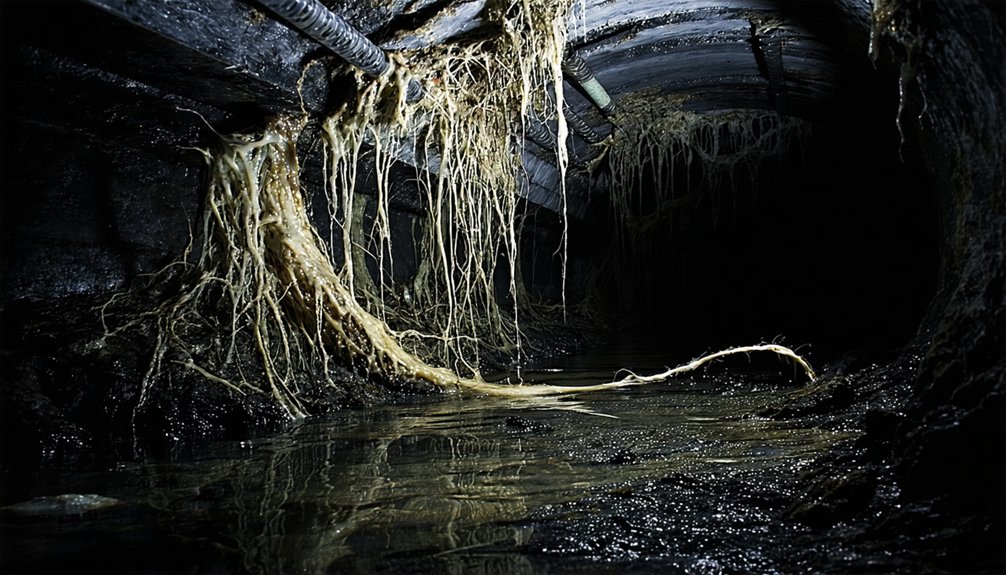To effectively prevent sewer line clogs, implement mindful disposal practices. Only flush human waste and toilet paper. Avoid disposing of non-flushable items and grease in sinks. Regular maintenance is essential; apply enzyme cleaners monthly and schedule professional inspections every two years. Homeowners should also be aware of signs indicating professional help is needed, such as odors or slow drains. By understanding these strategies, they can enhance system efficiency and prevent costly repairs. Further insights await.
Mindful Disposal Practices
Mindful disposal practices play an essential role in maintaining the integrity of sewer lines and preventing clogs. Properly educating household members on correct disposal methods is vital. Only human waste and toilet paper should be flushed down the toilet; non-flushable items like wipes and hygiene products can lead to severe blockages. Grease, oil, and fat must be disposed of in sealed containers rather than being poured down sinks, as they can solidify and obstruct pipes. Utilizing food strainers in kitchen sinks effectively captures food particles, preventing them from entering the drainage system. Regular cleaning of drain screens and stoppers is necessary to eliminate hair and debris accumulation, which contributes to clogged drains over time. By adhering to these mindful disposal practices, households can greatly reduce the risk of sewer line issues and promote a more efficient waste management system.
Regular Maintenance Techniques
Effective waste disposal practices lay the groundwork for maintaining clear sewer lines; however, regular maintenance techniques are equally essential in preventing clogs and ensuring system longevity. Implementing a structured maintenance routine can greatly reduce the risk of blockages. Key actions include:
Regular maintenance techniques are vital for preventing clogs and ensuring the longevity of sewer systems.
- Monthly application of enzyme cleaners to break down organic matter without damaging plumbing systems.
- Scheduling professional sewer line inspections every two years to identify potential blockages or deterioration using advanced camera technology.
- Annual rooter cleaning to remove debris buildup and keep sewer lines clear.
- Regular cleaning and installation of drain screens in sinks and showers to capture hair and food scraps.
In addition, monitoring household disposal practices is crucial; educating family members to flush only toilet paper and avoid disposing of grease and non-flushable items enhances the effectiveness of these maintenance efforts, ultimately preventing clogs and prolonging system life.
Signs You Need Professional Help
When persistent sewer line clogs arise, they often signal deeper issues that require professional diagnosis and intervention. Homeowners should be alert to signs such as sewer odors indoors, which indicate potential backups or pipe breaks, necessitating immediate professional help. Additionally, gurgling noises from drains or multiple clogged fixtures can denote serious sewer line problems that require a plumber's expertise.
Flooding or sewage backups in a residence are unmistakable indicators of a major blockage, demanding prompt action to mitigate health hazards. Furthermore, if slow-draining sinks or toilets are observed, this may be a precursor to significant clogs, warranting a professional inspection before the situation escalates. Recognizing these warning signs is essential for maintaining a functional sewer system and preventing extensive damage, underscoring the importance of seeking professional assistance when necessary.
Frequently Asked Questions
How to Keep Your Main Sewer Line From Clogging?
To keep the main sewer line from clogging, one must adhere to specific drain maintenance tips. Implementing proper grease disposal methods, controlling tree roots, and establishing a plumbing inspections schedule are essential. Additionally, following toilet usage guidelines and practicing food waste management can greatly reduce blockage risks. The impact of cleaning products should be considered, along with seasonal sewer care and pipe material considerations. Finally, ensuring sump pump function can further mitigate clogs.
How Often Should You Hydro Jet Your Sewer Line?
Hydro jetting frequency should be determined based on specific plumbing conditions. For ideal sewer maintenance, it is recommended every 1 to 2 years, while homes with older systems may require it every 6 to 12 months. Incorporating drain cleaning techniques and root intrusion prevention measures enhances effectiveness. Regular plumbing inspections can identify issues, while grease trap management and seasonal sewer care guarantee smooth operation. Engaging professional services can further streamline this essential maintenance.
How Do I Stop My Sewer From Backing Up?
To stop sewer backups, one must adhere to sewer maintenance tips and plumbing best practices. Implement waste disposal guidelines by avoiding flushing non-biodegradable items. Utilize drain cleaning techniques, including regular inspections and DIY plumbing solutions. Guarantee root intrusion prevention by scheduling annual professional cleanings. Manage grease trap effectively, and regularly consult a seasonal inspection checklist to detect issues early. For persistent problems, consider emergency plumbing services for immediate resolution.
What Is One Simple Thing We Can Do to Prevent Against Blocking the Sewage System?
To effectively prevent blockages in the sewage system, implementing drain screens stands out as a simple yet impactful measure. These screens capture hair and food scraps, minimizing debris entering the pipes. Additionally, proper grease disposal is essential, as fats can harden and obstruct flow. Educating household members on toilet habits, particularly avoiding flushable wipes, complements this strategy. Regular inspections also help detect potential root intrusion and other issues before they escalate, ensuring an unobstructed sewage system.


